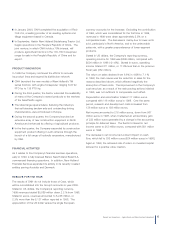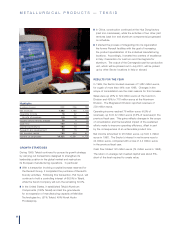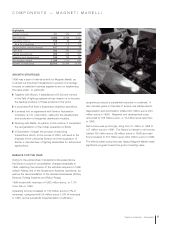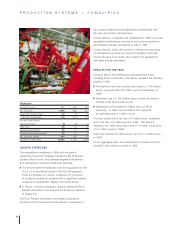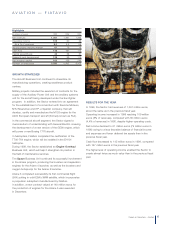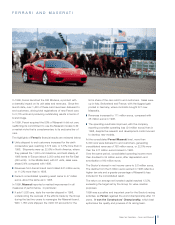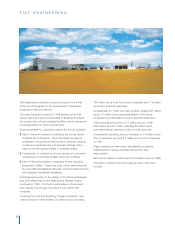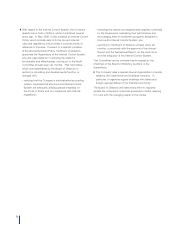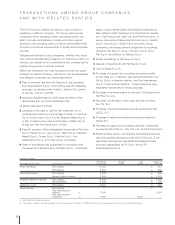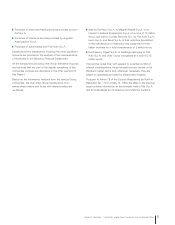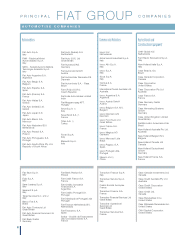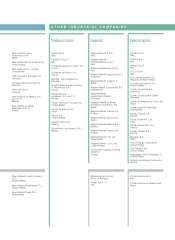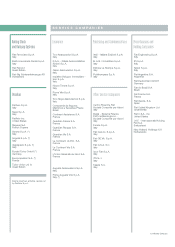Chrysler 1999 Annual Report Download - page 54
Download and view the complete annual report
Please find page 54 of the 1999 Chrysler annual report below. You can navigate through the pages in the report by either clicking on the pages listed below, or by using the keyword search tool below to find specific information within the annual report.
53
Report on Operations – Corporate Governance
CORPORATE GOVERNANCE
In order to provide a reference point for an effective corporate
governance system, the Fiat Group adopted the Code of
Conduct for Listed Companies, the recent publication of
which represents the final element of the framework of
statutory provisions and internal regulations introduced by
the Consolidated Law on Financial Intermediation.
Fiat has already amended its Articles of Association to comply
with the provisions of this law, introducing rules that are more
meaningful in terms of the information that executive Directors
are required to provide to the Board of Directors and the
Board of Statutory Auditors, and inserted a new provision
specifically designed to ensure the election of a Statutory
Auditor by minority stockholders.
The Company’s overall corporate governance system is largely
consistent with the recommendations and provisions of the
Code of Conduct, providing specific behavioral guidelines,
the most important of which are listed below:
❚As a general rule, the Board of Directors meets eight times
a year. On those occasions, it reviews the performance of
the operating Sectors, the Company’s quarterly reports,
strategic plans and organizational proposals, and all material
transactions proposed by executive Directors.
❚In order to establish a more efficient management system,
the Board of Directors has traditionally favored a type of
organization based on the delegation of equal powers to
those corporate officers who, in accordance with Article
18 of the Articles of Association, have been authorized
to act severally as the Company’s legal representatives.
Consequently, on June 23, 1999, the Board of Directors
gave the Chairman, Paolo Fresco, and the Chief Executive
Officer, Paolo Cantarella, broad operating powers,
authorizing them to perform all acts that are consistent
with the Company’s purpose. However, the Chairman
has indicated that he intends to primarily focus the exercise
of his functions, in close collaboration with the Chief
Excecutive Officer, on the Group’s strategy, its international
relationships and negotiations, the development and
enhancement of its human resources and the optimization
of its financial resources.
❚Notwithstanding the ample powers granted to them, the
Chairman and the Chief Executive Officer must regularly
submit for approval to the Board of Directors all transactions
that have a material impact on the Company’s profitability,
balance sheet and financial position, and must provide
Directors and Statutory Auditors with adequate information
on any transaction performed by virtue of the powers
granted to them which may be atypical, unusual or involve
related parties.
❚The current Board of Directors, which will remain in office
until a Stockholders’ Meeting is convened to approve the
financial statements at December 31, 2001, comprises 11
members, including the Chairman and the Chief Executive
Officer who have executive powers. Three other directors
(Gabriele Galateri, Chief Executive Officer of IFI, Virgilio
Marrone, Joint Chief Operating Officer of IFI, and John Philip
Elkann) are parties to transactions involving the Company’s
controlling stockholder.
❚The Board of Directors established two internal committees:
the Audit Committee, which comprises four non-executive
Directors (Gabriele Galateri, who chairs the Committee,
John Philip Elkann, Gianfranco Gutty and Carl L. von
Boehm-Bezing); and the Compensation Committee, which
comprises four Directors, two of whom have executive
authority (Paolo Fresco, who chairs the Committee, Paolo
Cantarella, Franzo Grande Stevens and John F. Welch).
❚The Compensation Committee develops proposals, which
it submits for approval to the Board of Directors, in the
areas of:
- Appointments to corporate posts at the Group’s
subsidiaries and the respective development and back-
up plans;
- General and individual compensation plans for “first level”
employees and stock option plans;
- Compensation for executive Directors which may include
stock options or appreciation rights.
The Committee will adopt resolutions in the absence of the
Chief Executive Officer whenever the CEO’s compensation
is discussed and in the absence of the Chairman and the
Chief Executive Officer whenever the Chairman’s
compensation is discussed.
❚The Board of Directors, with the favorable opinion of the
Board of Statutory Auditors, determines the compensation
of executive Directors. The entire compensation payable
to the Chairman is variable, while only a portion of the
compensation payable to the Chief Executive Officer is
variable. The amount of the abovementioned compensation
and the respective computation criteria are explained in
schedule entitled “Fees paid to Directors and Statutory
Auditors,” which appears at the end of the Notes to the
Statutory Financial Statements.
❚The Board of Directors recently approved a procedure for the
handling of confidential information, which defines functions,
responsibilities and the procedures that must be followed in
communicating to the external and to the general public
information that may be considered “price sensitive.”


